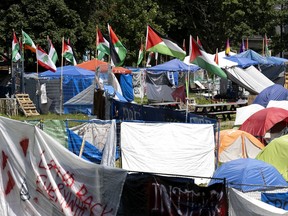The SSMU says the university threatened to cut off its funding if it didn’t cut off support for SPHR.

In a message to its membership on Monday, the board of directors of the Students’ Society of McGill University (SSMU) said it had made the “difficult and split decision” to revoke the status of Solidarity For Palestinian Human Rights (SPHR McGill) as an SSMU club, effective Sept. 5.
The message went on to say that McGill’s deputy provost had issued the SSMU a notice of default regarding the Memorandum of Agreement (MoA) between McGill and the SSMU. The MoA is a contract that governs the relationship between the university and the student union, and allows McGill to place the student fees that fund the SSMU in a trust if the SSMU violates its own policies, its constitution or the policies of McGill.
Without control of the use of its student fees, the SSMU would be significantly hampered in its ability to function, the SSMU board’s letter explained, adding that the SSMU has been trying to renegotiate the MoA to “reclaim the SSMU’s political autonomy”.
“The SSMU’s legal counsel does not agree that the SSMU was in default (of the MoA),” the SSMU board’s message goes on to say. “This decision was taken due to the repercussions of McGill proceeding with the default process prescribed by the MoA, which would make it very difficult for the SSMU to support is members, clubs or services while fighting McGill regarding the MoA. Disputing McGill’s decision to put the SSMU’s funds in trust would also cost the SSMU substantial legal fees.”
McGill’s administration has been trying for months to get the SSMU to intervene with SPHR to get the latter to stop using the McGill name on its social media accounts.
As of Tuesday evening, the group was still using “Solidarity for Palestinian Human Rights McGill – SPHR McGill” on its social media accounts.
In a “notice of default” sent to SSMU President Dymetri Taylor on July 10, McGill’s Interim Deputy Provost Angela Campbell outlined the administration’s past efforts to have the SSMU intervene with the SPHR club.
She referred to “deeply troubling behaviour” by SPHR members, including “glorification of violence against civilians following Hamas’s terrorist attack on Oct. 7, threats to and harassment of McGill community members, support for the forced entry into and attempted occupation of the James Administration Building, as well as the obstruction of university activities and damage to university property.”
“SPHR’s conduct stands in clear violation of McGill policies. As SPHR is your club, the result is that SSMU is in breach of these policies,” Campbell wrote.
The SSMU was required to remedy these “events of default” within 60 calendar days of notification, which meant before Sept. 8, 2024.
“Such remedy would require the severance of SSMU’s relationships with SPHR notably, but not exclusively, through the removal of its status as an SSMU club and cessation of any funding to this group….Failure to take these measures will result in the MoA’s termination … without further notice,” Campbell wrote.
“While we might hold our own personal views about the war and humanitarian crisis occurring in the Middle East, our roles require (us) to focus on the students of McGill, all of them, in accordance with the policies that govern our decisions. We cannot take actions that sacrifice the wellbeing and sense of inclusion of some students to advance personal or political goals and ideologies, particularly when doing so causes us to run afoul of policies and regulations that we are bound to follow,” she concluded.
“SPHR has been a source of hate and violent incitement at McGill University for many years. We are pleased that the university has finally made the necessary decision to use its power to end the madness,” said Henry Topas, B’nai Brith Canada’s Quebec Regional Director.
SPHR McGill was not immediately available for comment on Tuesday.